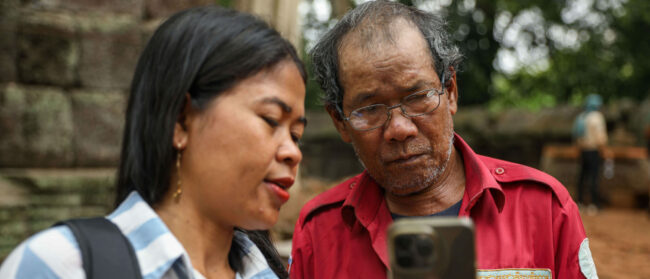This month, a Twitter war has broken out, with users from Thailand, Taiwan, and Hong Kong banding together against Chinese nationalists.
Its origins were relatively innocuous. A Thai celebrity retweeted a photo that implied that Taiwan was a country. Soon after, he was bombarded with criticism from mainland Chinese and quickly apologised.
But the Chinese brigade wasn’t done. A twitter account was found with a profile photo of the lead actor’s model girlfriend, who is also Thai, and the handle “nnevvy”. Nnevvy had retweeted an article questioning whether coronavirus had originated in a Wuhan lab.
From there, #nnevvy devolved into an all-out internet battle between Chinese and Thai users, with memes and insults flying between the two sides. Insults quickly turned political, with Thais attempting to upset the nationalistic Chinese by bringing up sore spots including Taiwan, Hong Kong, Tiananmen Square, and China’s handling of the coronavirus.
The Chinese responded by attacking Thailand’s prime minister and king. But the Thais, a mostly young and liberal online demographic, merely laughed off insults to their leaders, saying that the Chinese were helping them to criticise their leaders where they could not.
Prajak Kongkirati of Bangkok’s Thammasat University told Reuters “[t]his is the first transnational geopolitical Twitter war Thais have engaged in.”
Users from Taiwan and Hong Kong soon joined the fray. This included Hong Kong pro-democracy activist Joshua Wong, who called for “pan-Asian solidarity that opposes all forms of authoritarianism”. From there, a broader Southeast Asian coalition emerged under a new hashtag: The ‘Milk Tea Alliance’, so-named because of a collective love for sweet tea beverages.
The Chinese embassy in Bangkok, feeling pressure to respond, posted on Facebook to criticise those attacking China, deeming the One China policy “irrefutable”.
Twitter has increasingly become a political battleground. The 2016 United States presidential election, with Donald Trump’s love for communicating via the platform coupled with misleading articles and Russian bots, helped illustrate its potential for controlling domestic and global narratives – a fact not lost on China.
Young Australians in International Affairs’ East Asia Fellow, Erin Jory, recently wrote about China’s growing discourse power in the Indo-Pacific. So-called “wolf warriors”, named after a nationalistic Chinese blockbuster movie, bypass domestic firewalls and take to Twitter to aggressively promote China’s national interests at the slightest grievance.
Senior producer for CNN International, James Griffiths, suggests this incessant vocalised nationalism can create a feedback-loop, blinding those in China to political realities both domestically and abroad. This could result in miscalculations by the regime.
As the geopolitical feud plays out in cyberspace, the regional consequences of China’s damming of a major Southeast Asian river system have emerged. Twitter users are now harnessing #MilkTeaAlliance’s popularity to bring attention to this issue.
The Mekong, dubbed ‘Asia’s rice bowl’, is a river system that flows from China down through Laos, Thailand, Myanmar, Vietnam, and Cambodia.
Recent research from the Stimson Center reveals that China’s upstream dams have repeatedly caused droughts in countries downstream.
For instance, it found that for six months in 2019, Chinese dams held back so much water that they “entirely prevented the annual monsoon-driven rise in river level at Chiang Saen, Thailand”. This has not happened since records were kept.
In Vietnam, there are fears that up to a million people will have to move from the agricultural hub of the Mekong Delta due to climate change and upstream dams.
While initial financial estimates for damming projects forecast great profits, new assessments see Southeast Asian states taking a huge economic hit. The dams will block massive amounts of sediment, a component crucial for rice production and fisheries.
Additionally, the COVID-19 pandemic may cripple many of the economic projects spearheaded by China across Southeast Asia.
If repression of dissent continues alongside economic stagnation, discontent will fester. China will need to become much more conscious of its neighbours if it is to pursue its strategic interests in the Indo-Pacific effectively.
This story was co-published with the Young Australians in International Affairs.


